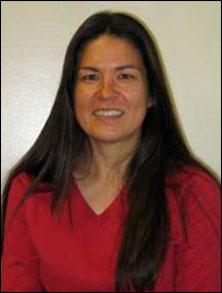 |
| Lisa Hines |
A new study led by Lisa Hines, assistant professor of biology at the University of Colorado at Colorado Springs, finds that factors known to increase the risk of breast cancer among white women have less influence in Hispanic women.
Published early online in CANCER, a peer-reviewed journal of the American Cancer Society, the study indicates that research is needed to evaluate how breast cancer risk factors differ among ethnic and racial populations.
Breast cancer occurs more frequently in certain ethnic and racial groups, but the reasons behind these differences are not fully understood. To investigate the issue, Hines led a study that considered how established breast cancer risk factors – including reproductive history, family history of breast cancer, menstrual history, hormone use, alcohol consumption, physical activity, height and body mass index – might be involved in explaining some of the observed differences in the occurrence of breast cancer among racial and ethnic groups.
They studied breast cancer among women from the Southwest United States who were enrolled in the population-based, case-control Four Corners Breast Cancer Study, which was designed to investigate factors that contribute to the difference in breast cancer incidence rates observed between Hispanic and non-Hispanic white women.
Prior studies have shown that non-Hispanic white women have a higher incidence of breast cancer than Hispanic women. In this current study, the researchers found that 62 percent to 75 percent of breast cancer cases among non-Hispanic white women were attributed to known breast cancer risk factors, compared with only 7 to 36 percent of cases among Hispanic women. Hispanic women were more likely to have characteristics associated with lower breast cancer risk, such as earlier age at first childbirth, having more children, shorter height, less hormone use and less alcohol consumption. Among premenopausal women, taller height and family history of breast cancer were associated with increased risk in non-Hispanic white women but were not among Hispanic women. Among postmenopausal women, certain breast cancer risk factors in non-Hispanic whites (such as recent hormone therapy use and younger age at menarche) had no or only weak associations with breast cancer in Hispanics.
These findings suggest that many of the risk factors studied to date explain fewer of the breast cancer cases that arise in Hispanic women compared with non-Hispanic white women.
"These differences are likely to contribute to disparities in breast cancer incidence rates, and could potentially reflect differences in breast cancer development among these ethnic groups," Hines said. For example, ethnic differences in genetic and environmental or lifestyle factors might affect individuals' susceptibility to the development of breast cancer.
The authors noted that the study's findings also indicate that the use of models to estimate a woman's risk of breast cancer that were developed from studies among non-Hispanic white populations need to be evaluated among other ethnic and racial populations.

|